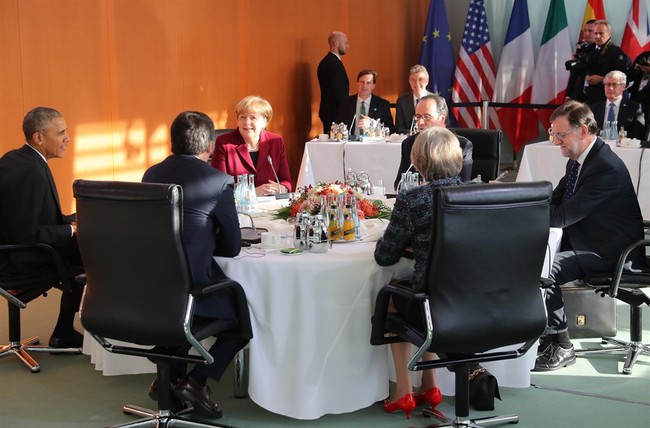We support our Publishers and Content Creators. You can view this story on their website by CLICKING HERE.

“For now,” anyway, but the qualifier might not be necessary for a while. The post-Cold War global-progressive project has come to screeching halts in the US (again) as well as several European Union nations, perhaps even Germany. It might end in Canada soon too, and perhaps even in the UK where Labour got a brief respite in the most recent elections.
Advertisement
So what has killed it? The Wall Street Journal chalks it up to economics, but that may just be the catalyst:
This past year showed that the progressive politics that dominated most industrialized countries over the past two decades or more is shifting to the right, fueled by working-class anxieties over the economy and immigration, and growing fatigue with issues from climate change to identity politics. …
Part of the shift is the normal pendulum of politics swinging back and forth between established parties on the left and right. The difference this time is a strong strain of populism and a growing rejection of traditional parties.
In country after country, many working-class voters—especially those outside the biggest cities—are signaling the same thing: They mistrust the establishment—from academics to bankers to traditional politicians—and feel these elites are out of touch and don’t care about people like them.
Years of increased migration and trade, coupled with low economic growth, have led to a backlash and a rise in nationalism, where people want more of a sense of control, political analysts say. The rise of social media has exacerbated divisions and led to an upsurge in antiestablishment parties.
Indeed, but that doesn’t mean that the moment is entirely over. France remains mired in its progressive-nigh-unto-Marxist moment that has existed in some degree since 1968. As noted, the UK went the other direction in its last election too, and in the US, an incompetent and semi-coherent Kamala Harris still got 46% of the vote. On a more meta scale, we’ve counted out the Marxists and their diluted political flavors before too, ever since the Soviet Union’s collapse proved the invalidity of communism and socialism. It didn’t take long for people to opt right back into it when establishment parties failed to meet their own “moment” too.
Advertisement
Could this be different? Perhaps, and maybe only because the lies and contradictions have grown too large to overlook. The progressives mishandled the pandemic in practically every possible way, using it to seize power and lying through their teeth to keep it as long as possible. Tim Walz was hardly the only politician guilty of this, although his Stasi-esque neighborhood snitch line was one particularly extreme example.
One key indicator that the WSJ may have this right comes ironically from Keir Starmer. A month ago, the UK’s Labour PM admitted what had long been alleged about “open borders” — that it was not a failure of policy but a deliberate progressive experiment in building multicultural societies. And it had spectacularly failed, too, which Starmer hilariously tried to blame on the Tories — who had to execute Brexit to stop immigration into the UK.
Absolutely laughable for @Keir_Starmer to blame immigration on Brexit and the @Conservatives.
Here’s Prime Minister Gordon Brown calling a lifelong Labour voter a “bigoted woman” for daring to question migration levels in 2010.
Tony Blair had opened the floodgates in 1997. pic.twitter.com/zK5YZ8bRqS
— Peter Lloyd (@Suffragent_) November 29, 2024
Indeed, and this was six years before Brexit, too. Gordon Brown’s elitist attitude reflected that of the global-progressive elite clique, and that is in large part what has prompted this populist reaction over the last few years — including Brexit itself and the election of Donald Trump.
Advertisement
Economics are part of this too, but are more of a symptom than a root cause. Western economics has suffered from climate-change hysteria pushed by the progressive Left as a means to seize control of energy production. Where that has succeeded, in Germany and the UK to some extent, it has produced economic hardship and promises more of the same for the future. Germany in particular has a crisis on its hands which will shrink its income and wealth unless it takes rapid steps to return to reliable and scalable energy production. The US went in this direction to a lesser extent in the Obama and Biden years too, but they didn’t have enough buy-in to do the kind of extensive damage that the radicals did in Germany.
Add in the lies about the pandemic, transgenderism, forced multiculturalism through open borders, and wokery in general. Those are the first causes of the rejection of the progressive “moment” and of the neo-Marxists who seized power through it. When it began to damage economies enough for voters to notice, not to mention all of the other quality-of-life indicators that matter to the electorate, then the rejection was not just predictable but long overdue.
Will it last? We should probably consider enjoying it while it does, but that is why the progressive moment keeps returning. Javier Milei understands this, which is why he acted with vigor and commitment to reversing all of the progressive nonsense that derailed what had been one of the wealthiest countries in the world in Argentina. We cannot just allow failure to continue through a lack of intestinal fortitude. A sharp return to free markets and constitutionally constrained government is the best way to keep the Marxists on the fringe — not to mention an end to federal funding of any kind of Academia.
Advertisement
Maybe this time we’ll get it right.

 Conservative
Conservative  Search
Search Trending
Trending Current News
Current News 







